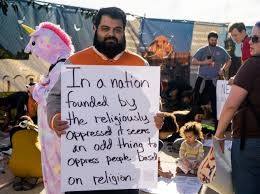There are some things that just don’t go well together: oil and water, you and your ex, alcohol and logical decisions, etc. All of those combinations are pretty bad. However, if there’s one combination that trumps, if you will, all of the aforementioned horrible duos, I’d say that religion and politics have a pretty strong case for being the worst.
Religion and politics were never meant to marry in the United States. The First Amendment’s Establishment Clause states that “Congress shall make no law respecting an establishment of religion.”
This entails that we may practice any religion we want without government interference as well as assures the public that the government will not be partial towards any religion over another or a non-religion.
The Founding Fathers knew the dangers of theocratic government and sought to build an explicitly secular system. That’s not to say America wasn’t founded as a Christian nation. The difference is that Christianity, or any religion for that matter, was not to influence government decision-making.
That all sounds pretty sweet, until you remember that up until relatively recently, June 26, 2015, to be exact, the legality of same-sex marriages was decided on a state-by-state basis, and the reason for this was cited as the single most popular and remarkable piece of mythology ever penned: the Bible.
At the time of this landmark civil rights ruling a mere three years ago, a total of 37 states had made same-sex marriage legal, leaving the remaining 13 lagging behind due to their adherence to archaic principles.
There was never really a reason why a state’s government should interfere with a couple’s right to marry in the first place, other than interpreting the Bible as claiming that homosexuality is sinful, unnatural and opposes the traditional view of marriage as a means for procreation.
RELATED: OPINION: Arizona about to elect its first female senator, but gender equality issues remain
Fortunately, these views have changed over the years, leaving many denominations more accepting of homosexuality than they had been previously. Hooray! Progressive values for the win, right?
Wrong.
If you happened to just wake up from a very long nap, I’ve got some news for you: Donald Trump is president. I know how tempting it is to fall back asleep, but don’t go just yet. Besides, who knows? The next time you wake up, L. Ron Hubbard’s preserved head in a jar of formaldehyde might be running this country. Anything’s possible.
The campaign and subsequent election of President Trump has brought an abundance of logical fallacies to our attention, some of which are the unfortunate results of religious values being included in American voters’ resolves.
According to the Pew Research Center, 81 percent of evangelical Christians voted for Trump, as did 61 percent of Mormons, 60 percent of white Catholics, 58 percent of Protestants and 24 percent of Jews. Oy vey.
Those statistics aren’t the least bit unusual: in 2004, 78 percent of evangelicals voted for Republican candidate George W. Bush over Democrat John Kerry; in 2008, 74 percent voted for John McCain and in 2012, 78 percent favored Mitt Romney. Objectively speaking, religious voters of Christian faith lean more towards the right of the political spectrum. But why?
According to American talk radio host Bill Press, author of the 2006 book How the Republicans Stole Religion: Why the Religious Right is Wrong about Faith & Politics and What We Can Do to Make it Right, “The election of 2004 made it official. With the help of religious conservatives, Republicans have stolen religion. Of course, it’s not just liberal Catholics they stole it from. Liberals, moderates and progressives of all faiths — Catholics, Protestants, Jews, Muslims and Buddhists — are all suddenly out in the cold. Because conservative Christians have taken over the Republican party and have declared a monopoly on religion.”
RELATED: Faith communities and religious orders on campus
The application of Christian values to political ones has become much more transparent as a consequence of the 2016 presidential election. But what has become even more transparent is the irony of the situation: Trump garnered the support of 4 in 5 evangelical Christians, though he is the physical manifestation of all the things in which Christians (claim to) condemn.
His campaign centered on “promises” like building the notorious “wall” between the US and Mexico, proposing a Muslim ban and generalizing an entire religion in the wake of the 2015 Paris and San Bernardino attacks and pushing to repeal the Affordable Care Act, leaving millions of Americans uninsured. Aren’t you supposed to love thy neighbor or something? (Side note: what about the sanctity of marriage? The Bible clearly states that a married man shall not lie with a woman who isn’t his wife.)
It is one of the great mysteries of the world why any sentient human being with even an ounce of morality, or a Christian who claims the values of the president are in stark contrast with that of his or her beliefs, would cast his or her ballot, after careful and logical consideration, in favor of Donald Trump.
Now, if you’ll excuse me, I need to pick up some more formaldehyde.
Follow the Daily Wildcat on Twitter









